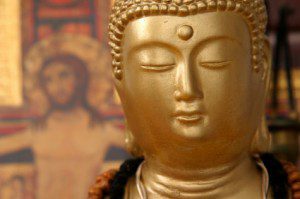“If you see a Buddha on the road, kill him.” What about Jesus? I got into a conversation on this topic the other morning over breakfast with a Buddhist friend. The exchange has lingered on to this day, and no doubt, will last a lifetime of discussions with my friend.
Before proceeding, it is important to try and place the quotation in context. I found a reflection on this quotation online. According to one interpreter, Dyung Le,
The context of this phrase is from a[n] old Zen koan attributed to Zen Master Linji, (the founder of the Rinzai sect). The whole saying is “If you meet a Buddha, kill the Buddha. If you meet a Ghost, kill the Ghost”…
Advanced meditators often get into a state where they start to see (‘visualize’) various phenomena (light, flying, scenery, etc.) Very often they see deities, Bodhisattvas, Buddhas, holding forth with teachings, or appearing to give blessing, etc.
Since Zen meditators seek to be free to all emotion, thoughts, concepts, etc., and the Buddha itself is but a “concept”, if you “see” the Buddha, make sure to get rid of him. Do not get attached to him. He’s no different than a ghost, both are construct[s] of your mind.
It should be noted that this saying is entirely within the Zen context. In other Buddhist schools (Pure Land for example), practitioners seek to “meet the Buddha” and would be overjoyed to “see” the Buddha in their dreams!
Not everyone will agree at every turn with Le’s interpretation of the famous Buddhist phrase, but it does get the conversation going. My Buddhist friend alluded to earlier, George Draffan, Executive Director of the Northwest Dharma Association, also commented on the striking statement. For Draffan, the intent of the original phrase is not to kill the Buddha, but rather, an idolized notion of the Buddha. Moreover,
Buddhists are not trying to be free of thoughts and emotions, but not to be ensnared by the error of giving them more substance than they actually have. Not to believe my ideas of Buddha are actually Buddha.
The “Buddha” I would kill is only my idolized projection. The actual Buddha is the awakened compassion that is the true nature of all beings. I could not kill that if I tried. So Buddha is both the means and the end: taking refuge in and relying upon the awakened heart-mind that is already the actual nature of every one of us—perhaps a little like reuniting with God from whom we’ve never been separate?
What about Jesus? The only “Jesus” a Christian should “kill” is a construct of him that does not reflect the teaching of Christian Scripture. A Rambo-esque version of Jesus or Talladega Nights’ Ricky Bobby’s “eight pound, six ounce baby Jesus” image are idols that we should abandon. But Christians must hold fast to the Jesus of Christian Scripture who lays down his life for his enemies and who is consumed with zeal for his Father’s house, not base consumerism. Whether or not one uses the language of attachment, we must abide in him and his word (See John 15:4, 7).
While a Christian should never kill Jesus, we are in danger of doing so, if we abandon worship of him. Here is what the writer of Hebrews claims:
For it is impossible, in the case of those who have once been enlightened, who have tasted the heavenly gift, and have shared in the Holy Spirit, and have tasted the goodness of the word of God and the powers of the age to come, and then have fallen away, to restore them again to repentance, since they are crucifying once again the Son of God to their own harm and holding him up to contempt (Hebrews 6:4-6; ESV).
These Christians were attempted to abandon their faith in Jesus as a result of persecution. According to the writer, if they were to abandon the faith, there would be no possibility of restoration, for they were crucifying anew the Lord, God’s Son. Draffan puts the matter well for both Christian and Buddhist traditions, when reflecting upon loyalty to Christ and Buddha respectively.
A Christian would not worship a crucifix or a statue or a limited (projected, self-constructed) idea, but would die before denying the true Christ or God. Worshipping a crucifix is idolatry; relying on Christ is not.
A Buddhist is also taught to receive a beating or even give up one’s life before repudiating one’s vow to take refuge in Buddha (awakened heart), dharma (spiritual path), and sangha (sentient beings).
What differentiates the orthodox Buddhist from an orthodox Christian? We all partake of Buddha-hood, for the Buddhist, but only Jesus—who is the Christ—is God, according to orthodox Christianity; Jesus and the Christ are one for orthodox Christians. While we can be divinized, that is, made partakers of the divine nature (2 Peter 1:4), such divinization only results from our union with Jesus who remains distinct from us as the one and only Son of God. Jesus is not simply quantitatively greater (experiencing greater God-consciousness, for example); he is also qualitatively greater (See my blog post on Søren Kierkegaard and his response to the Socratic tradition represented by Hegelian thought: “Jesus Is No Midwife”).
The preceding discussion goes to show that it is very difficult to engage in a comparative analysis of Buddhism and Christianity. Not only should we kill idolatrous images of the Buddha and Christ, as the two traditions perceive idolatry respectively, but also we need to kill brush stroke assessments conveying hasty generalizations that fail to capture the essence of the particular traditions under discussion. Perhaps the lasting moral of the story is: if you see a hasty religious generalization on the road, kill it.














